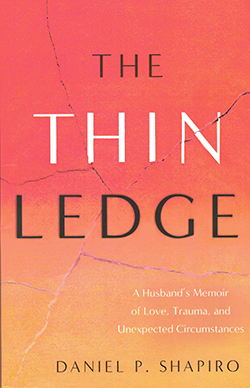The Thin Ledge: A Husband’s Memoir of Love, Trauma, and Unexpected Circumstances by Daniel P. Shapiro; River Grove Books; (c)2021; ISBN 9781632-992970; 232 pages; $15.95
By Donald H. Harrison

 SAN DIEGO — Attorney Daniel P. Shapiro deeply loved his wife Susan and their three children. He and Susan had enjoyed special moments together; places, songs, meals that ignited memories; meaningful yet unspoken understandings typical of the happily married. And then disaster in the form of a brain hemorrhage happened. Susan slurred her speech, lost her mobility, and seemed unable to relate with the rest of her family.
SAN DIEGO — Attorney Daniel P. Shapiro deeply loved his wife Susan and their three children. He and Susan had enjoyed special moments together; places, songs, meals that ignited memories; meaningful yet unspoken understandings typical of the happily married. And then disaster in the form of a brain hemorrhage happened. Susan slurred her speech, lost her mobility, and seemed unable to relate with the rest of her family.
A second hemorrhage made matters even more acute. Such a traumatic injury to the brain might have killed someone else, but Susan managed somehow to hold on. It may not even have been a matter of her will: she continued to exist, albeit with a personality so altered that Daniel wondered if she really was the same person that he had married.
This is a collection of Daniel’s journal entries over 15 years of being a caretaker to his wife, while continuing to excel in his law practice. Nannies took care of his children when he was away at the office or on business trips. The patterns of his life — and those of their children — changed , but no one suffered a greater change than Susan herself, who was left listless, unable to communicate any but her most basic needs, and addicted to the television which in the darkened house flickered in front of her night and day.
Some people reading Daniel’s journal will become angry at him; at times he seemed to wallow in self-pity over the fact that the wife, whom he had pledged to love “in sickness and health” and “for better or for worse” was both sick and increasingly worse. Other readers will sympathize with how frustrated Daniel felt; the woman felled by the brain hemorrhages, at least by the testimony of DNA, was the same person he had married, but on every other level she was different person. She was a stranger, one to whom he was tied by obligation. However, as time went on, fewer and fewer feelings of love tied them together.
In Daniel’s mental turmoil, he felt alienated from Susan, resentful, and at times he fantasized about being with other women, with whom he could share emotions as well as a bed. The thought came to him often that he wanted this to “be over,” but he could abide neither the ideas of homicide nor suicide.
For a decade and a half, Daniel continued to minister to the stranger Susan, whom society identified as his wife. While he dreamed of having affairs with other women, he felt obligated to remain faithful to her — whoever she was. He sought the advice of a therapist, who kept having him come back, but who failed to help him find a solution. Eventually, he turned to a rabbi, who knew of no precedent in Judaism, no citations in halakha, that would exactly cover his situation.
However, the rabbi stressed, Judaism teaches the doctrine, “choose life!”
This is a painful book to read, although for some who are, themselves, caregivers, it may validate deepest feelings that they never would express to others.
*
Donald H. Harrison is editor of San Diego Jewish World. He may be contacted via donald.harrison@sdjewishworld.com